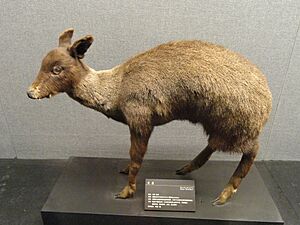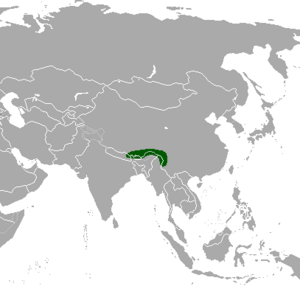Black musk deer facts for kids
Quick facts for kids Black musk deer |
|
|---|---|
 |
|
| Conservation status | |
| Scientific classification |
|
| Kingdom: | Animalia |
| Phylum: | Chordata |
| Class: | Mammalia |
| Order: | Artiodactyla |
| Family: | Moschidae |
| Genus: | Moschus |
| Species: |
M. fuscus
|
| Binomial name | |
| Moschus fuscus Li, 1981
|
|
 |
|
| Script error: The function "autoWithCaption" does not exist. | |
Script error: No such module "Check for conflicting parameters".
The black musk deer, also called the dusky musk deer (Moschus fuscus), is a special kind of animal that lives in parts of Asia. It is found in countries like Bhutan, China, India, Myanmar, and Nepal. This deer is known for its unique features and its shy nature.
Contents
About the Black Musk Deer
The black musk deer is a small animal, usually between 70 and 100 centimeters (about 2 to 3 feet) long. It weighs about 10 to 15 kilograms (22 to 33 pounds). These deer have long, strong back legs, which help them move around in rocky areas. They do not have antlers like many other deer.
Both male and female black musk deer look quite similar. They have thick, brown fur. Their ears and eyes are large, helping them to see and hear well. Male deer have two long upper teeth that stick out like small tusks. These are called "saber teeth."
How They Live
Black musk deer are mostly active at night, during dawn, and at dusk. This means they are nocturnal animals. They like to live alone and usually do not share their space with other deer. Males are very protective of their territory.
These deer live in mountains, often in deep valleys and forests. They are very good at climbing trees and moving easily on steep cliffs or through thick bushes. They can be quite fierce, especially when males fight over mates. They might growl or use their tusks and strong front hooves to fight. Black musk deer are also very careful. If they get scared in a place, they usually won't go back there again.
What They Eat
Black musk deer mostly eat plants. They like to munch on grass and other plants they find in their mountain homes. This helps keep the plants in their environment healthy.
Who Hunts Them
Many animals hunt the black musk deer. These include animals like the lynx, wolverine, and yellow-throated marten. But humans hunt them more than all other predators combined. People hunt them mainly for a special scent gland that male deer have. This gland produces a substance called "musk," which is used to make perfumes and some medicines.
Because of too much hunting, the black musk deer is now an endangered species. This means there are not many of them left in the wild.
Life Cycle
Black musk deer usually mate in November and December. During this time, male deer release scents to mark their territory and attract females.
After mating, the mother deer carries her babies for about six months. The babies are usually born in June or July. A mother deer typically gives birth to one or two young at a time. Newborns are small, weighing about 500 grams (a little over 1 pound), and they have spots on their fur.
The mother takes care of her young for several months. She feeds them milk for about three to four months. During this time, the young deer stay close to their mother, who protects and grooms them. By the time they are six months old, the young deer are usually full-grown. However, they are not ready to have their own babies until they are about 18 months old.
Threats to the Black Musk Deer
The black musk deer faces serious threats that put its future at risk.
One big problem is too much hunting. People hunt these deer for their musk glands. In the 1980s, the musk from a male deer was worth a lot of money, even more than its weight in gold! People also believe the musk has special healing powers, using it as a calming or energizing medicine. Because of this high demand, many deer have been hunted.
Another major threat is the loss of their home, or habitat. Forests where these deer live are being cut down, which is called deforestation. When forests disappear, the deer lose their food and safe places to live.
Because of overhunting and habitat loss, the black musk deer is now on the endangered list. This means their numbers have dropped a lot. When there are fewer black musk deer, it also affects other animals in the food chain, like the predators that rely on them for food. Not enough is being done to help save these unique deer from possibly disappearing forever.
 | Janet Taylor Pickett |
 | Synthia Saint James |
 | Howardena Pindell |
 | Faith Ringgold |


